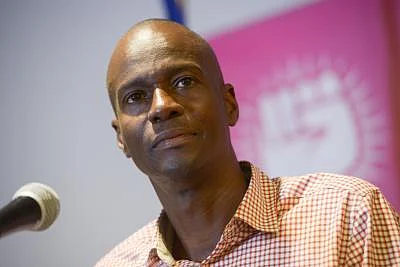Haitian President Jovenel Moïse was assassinated in the early hours of Wednesday, 7 July, at his home outside Port-au-Prince, the capital.
In response, the police killed four "mercenaries", who they believe were behind the attack. Interim Prime Minister Claude Joseph said highly trained gunmen assassinated the president. But as human rights groups urge an investigation into his murder, Haiti continues to spiral into a deep crisis it was already reeling from.
On Thursday, 8 July, Prime Minister Modi expressed condolences on Twitter. "Saddened by the assassination of President Jovenel Moïse and the attack on First Lady Martine Moïse of Haiti. My Condolences to the family of President Moïse and the people of Haiti," he tweeted.
A Contested Presidency
Jovenel Moïse came to power in 2017 at the age of 48 after a contested election that took 14 months to end. On swearing in, he had pledged to fight corruption, bring more jobs and boost the economy. But months into taking office, he was accused of undemocratic power grabs and using state violence to keep the opposition at bay.
His unpopularity with Haitians led to wide-scale protests for months before his assassination.
Earlier this year, the opposition argued that his five-year term should have ended on 7 February, but because of a year-long delay to elections after former president Michel Martelly's departure, Moïse insisted he continue to govern for one more year – a decision that was supported by the US State Department in March.
The US, which occupied Haiti from 1915 to 1934, has held sway over the country for decades although it has shared a tense relationship with some of the country's leaders.
Anti-Moïse protesters said they found similarities between the current regime and that of the Duvalier era, when François Duvalier and his son, Jean-Claude Duvalier allowed murders and brutalisation in Haiti to wield power whilst enjoying the support of US.
A week before the assassination, in a statement expressing "deep concern regarding deteriorating political, security and humanitarian conditions in Haiti", the United Nations Security Council on 1 July stressed the urgent need to hold free and fair legislative and presidential elections this year.
Moïse had proposed a referendum on changes to Haiti's Constitution, which would allow him to run for two consecutive terms (10 years) without any intervention. The Constitution that he sought to change was written in 1987 at the end of the Duvaliers' reign to ensure Haiti never fell prey to dictatorship.
This proposed referendum, the UN said, would end up abolishing the senate. The UN further added that this referendum drew criticism from key members for "lack of inclusivity and transparency of the constitutional review."
Battered by Crime and an Earthquake
Since the end of the Duvalier era, Haiti has struggled to wean itself from political instability. A rising incidence of crime and dire poverty has plagued the nation since the early 20th Century.
In 2019 alone, there were 787 reported homicides, with 636 occurring in West Department, which includes Port-au-Prince, according to a report by OSAC. The report further adds that gang-on-gang-violence continues to rise. Data compiled by the UN points out that 2020 witnessed 236 abduction cases – having tripled from what it was in 2019. The UN data also adds that these gang wars have displaced 5,000 people in just the first week of June this year.
Human rights groups and a report by the International Human Rights Clinic at Harvard Law School have accused the Moïse government of fostering ties with violent criminal gangs to continue exercising dominion and to suppress dissent. But Moïse had denied these claims, stating it was an effort to destabilise his administration, reported Reuters.
If crime wasn't all, a massive earthquake in 2010 and a subsequent cholera outbreak have also been responsible for exacerbating the crisis.
The earthquake, which is estimated to have killed 2,20,000 people and displaced 1.5 million, ravaged the country's infrastructure. Haiti is yet to be rebuilt on account of growing civil unrest.
Meanwhile, political demonstrations continue in full swing. In 2019, violent political protests rocked the country, as people took to streets to rage against the Moïse government, minimum wage concerns, fuel prices, fuel shortages, food prices, inflation, and the PetroCaribe corruption scandal.
Each of these factors contribute to making Haiti the poorest nation in Latin America. Grappling with food insecurity, corruption and political instability, Haiti is yet to administer vaccine to its citizens.
Now in a "state of siege" and further uncertainty following the assassination of its unpopular president, Haiti's hopes of being pulled out of debilitating political instability remain diminished.
(At The Quint, we question everything. Play an active role in shaping our journalism by becoming a member today.)
